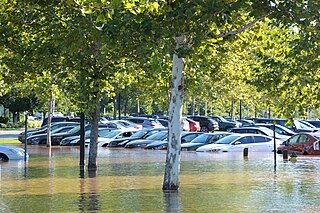Related Research Articles

Environmental law is a collective term encompassing aspects of the law that provide protection to the environment. A related but distinct set of regulatory regimes, now strongly influenced by environmental legal principles, focus on the management of specific natural resources, such as forests, minerals, or fisheries. Other areas, such as environmental impact assessment, may not fit neatly into either category, but are nonetheless important components of environmental law.

Environmental protection is the practice of protecting the natural environment by individuals, organizations and governments. Its objectives are to conserve natural resources and the existing natural environment and, where possible, to repair damage and reverse trends.

Environmental justice is a social movement to address the unfair exposure of poor and marginalized communities to harms associated with resource extraction, hazardous waste, and other land uses. The movement has generated hundreds of studies establishing this pattern of inequitable exposure to environmental harms, as well as a large interdisciplinary body of social science literature that includes theories of the environment and justice, environmental laws and policy, sustainability, and political ecology. The environmental justice movement began in the United States in the 1980s and was heavily influenced by the American civil rights movement.

Environmental Impact assessment (EIA) is the assessment of the environmental consequences of a plan, policy, program, or actual projects prior to the decision to move forward with the proposed action. In this context, the term "environmental impact assessment" (EIA) is usually used when applied to actual projects by individuals or companies and the term "strategic environmental assessment" (SEA) applies to policies, plans and programmes most often proposed by organs of state. It is a tool of environmental management forming a part of project approval and decision-making. Environmental assessments may be governed by rules of administrative procedure regarding public participation and documentation of decision making, and may be subject to judicial review.

Environmental policy is the commitment of an organization or government to the laws, regulations, and other policy mechanisms concerning environmental issues. These issues generally include air and water pollution, waste management, ecosystem management, maintenance of biodiversity, the management of natural resources, wildlife and endangered species. For example, concerning environmental policy, the implementation of an eco-energy-oriented policy at a global level to address the issues of global warming and climate changes could be addressed. Policies concerning energy or regulation of toxic substances including pesticides and many types of industrial waste are part of the topic of environmental policy. This policy can be deliberately taken to influence human activities and thereby prevent undesirable effects on the biophysical environment and natural resources, as well as to make sure that changes in the environment do not have unacceptable effects on humans.

Visual pollution is the visible deterioration and negative aesthetic quality of the natural and human-made landscapes around people. It refers to the impacts pollution has in impairing the quality of the landscape and is formed from compounding sources of pollution to create it. Visual pollution disturbs the functionality and enjoyment of a given area, limiting the ability for the wider ecological system, from humans to animals, to prosper and thrive within it from disruption to natural and human-made habitats. Although visual pollution can be caused by natural sources the predominant cause comes from human sources as the impact of humanity upon Earth has reached global devastation.
Health impact assessment (HIA) is defined as "a combination of procedures, methods, and tools by which a policy, program, or project may be judged as to its potential effects on the health of a population, and the distribution of those effects within the population."

The Ministry of Environment is the South Korea branch of government charged with environmental protection. In addition to enforcing regulations and sponsoring ecological research, the Ministry manages the national parks of South Korea. Its headquarters is in Sejong City.
A regulatory impact analysis or regulatory impact assessment (RIA) is a document created before a new government regulation is introduced. RIAs are produced in many countries, although their scope, content, role and influence on policy making vary.
Sustainable procurement is a process whereby organizations meet their needs for goods, services, works and utilities in a way that achieves value for money on a life-cycle basis while addressing equity principles for sustainable development, therefore benefiting societies and the environment across time and geographies. Procurement is often conducted via a tendering or competitive bidding process. The process is used to ensure the buyer receives goods, services or works for the best possible price, when aspects such as quality, quantity, time, and location are compared. Procurement is considered sustainable when organizations broadens this framework by meeting their needs for goods, services, works, and utilities in a way that achieves value for money and promotes positive outcomes not only for the organization itself but for the economy, environment, and society. This framework is also known as the triple bottom line, which is a business accounting framework. The concept of TBL is narrowly prescribed, and even John Elkington, who coined the term in the 1990s, now advocates its recall. Indeed, procurement practitioners have drawn attention to the fact that buying from smaller firms, locally, is an important aspect of sustainable procurement in the public sector. Ethics, culture, safety, diversity, inclusion, justice, human rights and the environment are additionally listed as important aspects of SPP.

The Equality Act 2010 is an Act of Parliament of the United Kingdom passed during the Brown ministry with the primary purpose of consolidating, updating and supplementing the numerous prior Acts and Regulations, that formed the basis of anti-discrimination law in mostly England, Scotland and Wales and some sections also apply to Northern Ireland. These consisted, primarily, the Equal Pay Act 1970, the Sex Discrimination Act 1975, the Race Relations Act 1976, the Disability Discrimination Act 1995 and three major statutory instruments protecting discrimination in employment on grounds of religion or belief, sexual orientation and age.
Policy Impact Assessments (IAs) are formal, evidence-based procedures that assess the economic, social, and environmental effects of public policy. They have been incorporated into policy making in the OECD countries and the European Commission.

Environmental issues are effects of human activity on the biophysical environment, most often of which are harmful effects that cause environmental degradation. Environmental protection is a practice of protecting the natural environment on the individual, organizational or governmental levels, for the benefit of both the environment and humans. Environmentalism, a social and environmental movement, addresses environmental issues through advocacy, legislation education and activism.

Environmental social science is the broad, transdisciplinary study of interrelations between humans and the natural environment. Environmental social scientists work within and between the fields of anthropology, communication studies, economics, geography, history, political science, psychology, and sociology; and also in the interdisciplinary fields of environmental studies, human ecology and political ecology, social epidemiology, among others.

The economics of climate change mitigation is the part of the economics of climate change related to climate change mitigation, that is actions that are designed to limit the amount of long-term climate change. Mitigation may be achieved through the reduction of greenhouse gas (GHG) emissions and the enhancement of sinks that absorb GHGs, for example forests.
Educational equity, also referred to as "Equity in education", is a contested notion. Ostensibly, it is a measure of achievement, fairness, and opportunity in education. The study of education equity is often linked with the study of excellence and equity.
Environmental inequality in the United Kingdom is the way in which the quality of the environment differs between different communities in the UK. These differences are felt across a number of aspects of the environment, including air pollution, access to green space and exposure to flood risk.

The National Planning Policy Framework (NPPF) is a land-use planning policy in the United Kingdom. It was originally published by the UK's Department of Communities and Local Government in March 2012, consolidating over two dozen previously issued documents called Planning Policy Statements (PPS) and Planning Policy Guidance Notes (PPG) for use in England. It has since been revised in 2018, 2019 and 2021.

Climate change vulnerability is defined as the "propensity or predisposition to be adversely affected" by climate change. It can apply to humans but also to natural systems (ecosystems). Climate change vulnerability encompasses "a variety of concepts and elements, including sensitivity or susceptibility to harm and lack of capacity to cope and adapt". Vulnerability is a component of climate risk. Vulnerability differs within communities and across societies, regions and countries, and can change over time. Approximately 3.3 to 3.6 billion people live in contexts that are highly vulnerable to climate change in 2021. Human and ecosystem vulnerability are interdependent.
References
- 1 2 "Ready: What is an equality impact assessment?". Equality impact assessment quick-start guide: A step-by-step guide to integrating equality impact assessment into policymaking and review (PDF). Equality and Human Rights Commission. March 2010. p. 3. ISBN 978-1-84206-269-2. Archived from the original (PDF document) on 23 December 2015. Retrieved 26 February 2016.
- ↑ 1619 (2015-11-03). "Equality Impact Assessment (EqIA)". www.glasgow.gov.uk. Retrieved 2022-06-18.
{{cite web}}: CS1 maint: numeric names: authors list (link) - ↑ BBC News. URL accessed 19 November 2012.
